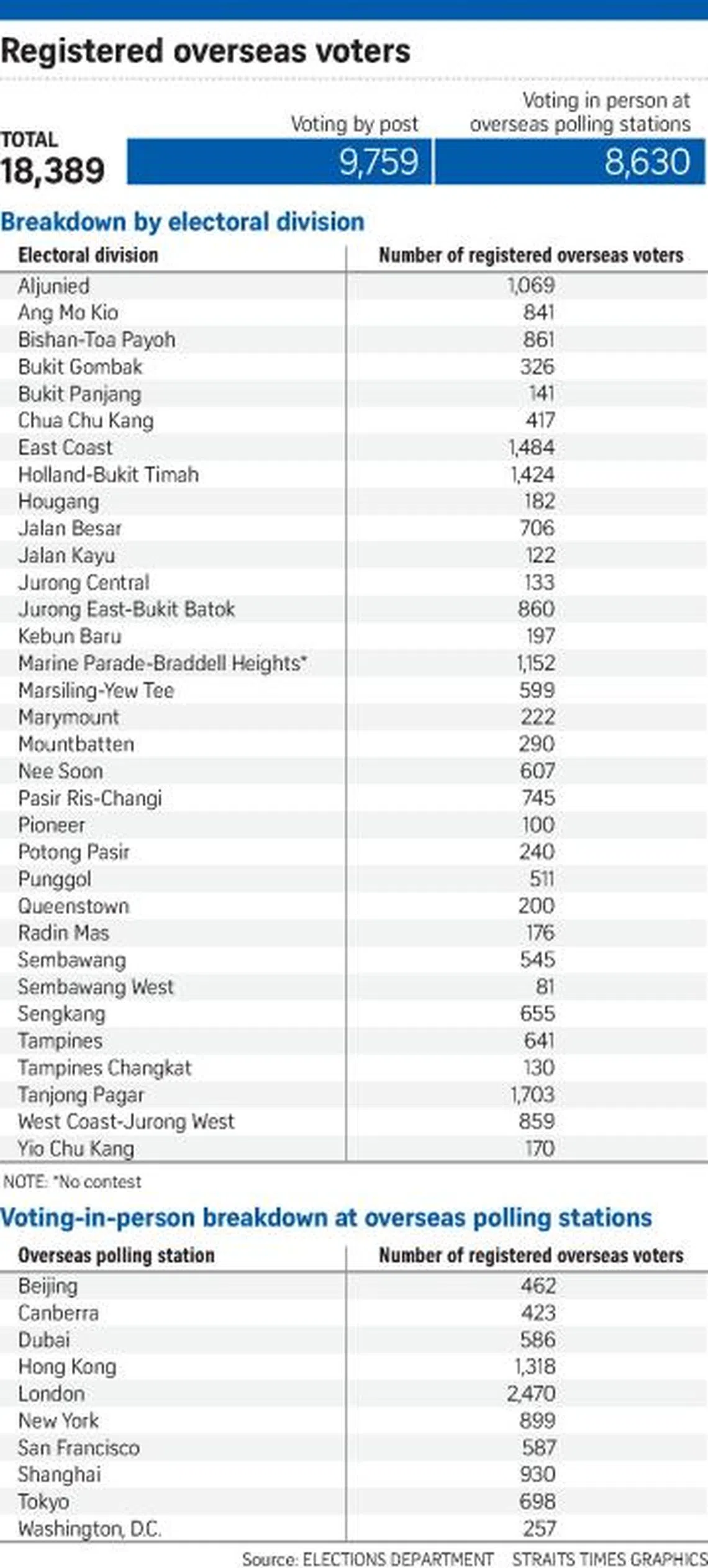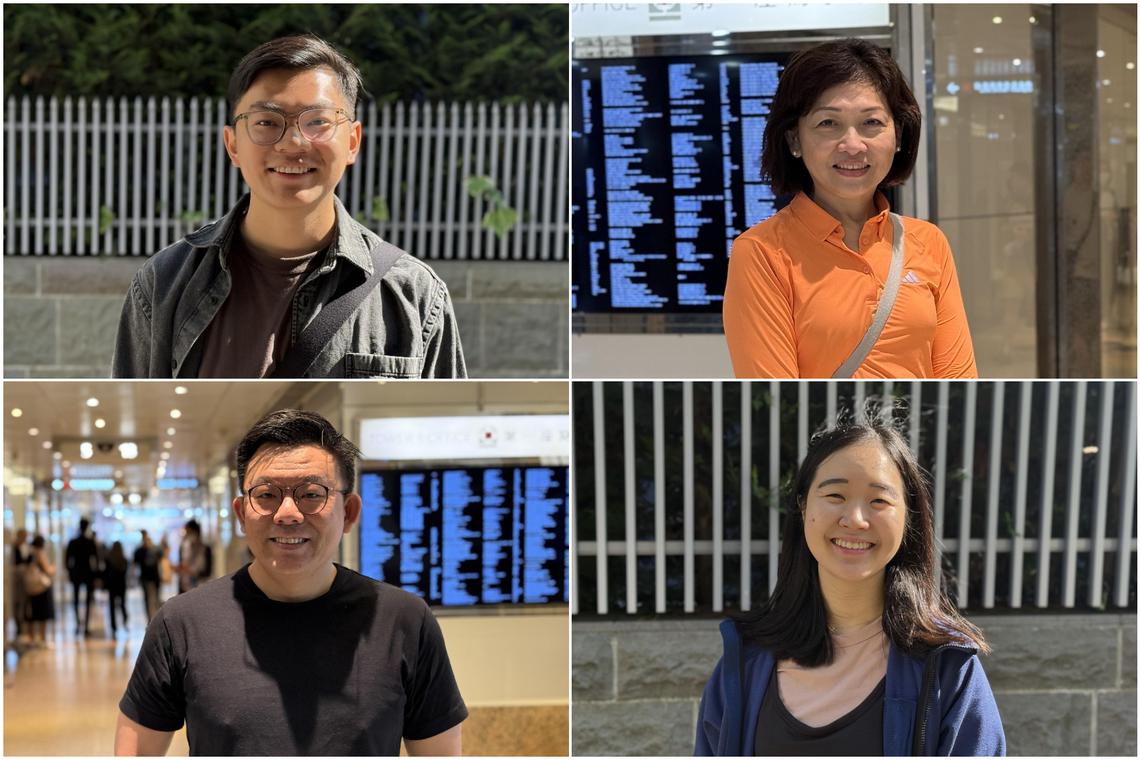Follow our live coverage.
HONG KONG/TOKYO/SHENZHEN/NEW YORK – Back home in Singapore, Mr Julian Chang, 24, used to pay little attention to politics, calling himself “apolitical”.
But since coming to Tokyo as an exchange student a month ago, he has been gripped by election fever, even though he has had to watch election rallies online instead of attending in person.
“I didn’t imagine I’d feel so patriotic in my first voting experience because, honestly, I’m quite apolitical at home and I don’t really care. But coming here, I realise that I do,” said Mr Chang, a Singapore Management University accountancy undergraduate who is on an exchange programme at Keio University and registered to vote in Hougang SMC.
On May 3, he turned up at the Singapore Embassy in Tokyo at around 8am local time.
There was a slight buzz of activity outside the building – located on a hill in the Azabujuban district – when voting opened, with people mingling outside its gates.
Many had come to vote early before proceeding with their plans for the Golden Week holidays, which run from April 29 to May 6.
Finance professional Annabelle Kan, 33, was also at the embassy in Tokyo early to cast her ballot hours before she was to fly to Okinawa on holiday with her family members.
While she has lived abroad for about 10 years, it was her first time voting overseas.
“It is a chance to really consider and think about issues that affect my family back home, even though I’m overseas,” the Mountbatten SMC voter said.
Singaporeans living abroad headed to the polls on May 3 – encountering no crowds and short waiting times – to cast their vote in the 2025 General Election at the nation’s overseas polling stations.
In Hong Kong, a short queue of about a dozen people had formed at the ground floor lift lobby of the Admiralty Centre office building housing the Singapore consulate by 7.50am, ahead of voting opening at 8am.
Among the first few in line was banker Christine Foo, who was voting from Hong Kong for the first time after relocating to the city for work in August 2024.
“I came at this hour because I’m an early riser,” Ms Foo, 55, told The Straits Times after she had cast her ballot. “The voting process was very smooth; there was no crowd, and I was done in less than five minutes.”

Banker Christine Foo was among the first few in line to vote at Singapore’s Consulate-General in Hong Kong.ST PHOTO: MAGDALENE FUNG
Ms Foo, who is registered to vote in the Holland-Bukit Timah GRC, said that as a “true blue Singaporean and a former grassroots leader”, she felt privileged to be able to vote.
“I believe that one should ask not what your country can do for you, but what you can do for it first,” said the banker, who added that she respects diversity and hopes for peace and stability for the people of Singapore.
This general election is the first electoral test for Prime Minister Lawrence Wong, who took over from Senior Minister Lee Hsien Loong and was sworn in on May 15, 2024.
Voting is compulsory for Singaporeans aged at least 21.
Of the 2.75 million Singaporeans eligible to vote in this election, 18,389 were registered as overseas voters, according to the Elections Department (ELD). Among them, 8,630 have registered to vote in person while 9,759 registered to vote by post.
The 1,152 registered overseas voters in the Marine Parade-Braddell Heights GRC will not participate in the ballot as the constituency’s PAP team won in a walkover.
Of the 33 electoral divisions, Tanjong Pagar GRC has the most overseas voters at 1,703, while Sembawang West SMC has the fewest at just 81.
Singapore has overseas polling stations in the following 10 cities where there is a significant number of Singaporeans: Beijing, Canberra, Dubai, Hong Kong, London, New York, San Francisco, Shanghai, Tokyo and Washington DC.
Research manager Ian Tan, who was voting from Hong Kong for the third time, said that while there was a short queue when he arrived at the consulate slightly before 11am, he took barely 10 minutes to complete the voting process.

Voter Ian Tan at Admiralty Centre, which houses Singapore’s Consulate-General in Hong Kong, on May 3.ST PHOTO: MAGDALENE FUNG
He also said that he followed the election campaign closely every day primarily through mainstream media outlets like ST, social media platforms like YouTube, and the views of key opinion leaders online.
“What motivates me to vote even though I’m overseas, is to share with my children what elections are and why it matters for us to exercise our voting rights,” Mr Tan, 39, a father of two young children aged six and six months, respectively, said.
“I am lucky that Singapore’s consulate in Hong Kong is just a short MTR (train) ride away for me,” he added.
Over in Shanghai, seasoned overseas voter Jason Ong arrived at the Singapore consulate shortly after doors opened at 8am to cast his ballot.
The 45-year-old, who runs a cross-border advisory business and has lived abroad for the past 24 years, said that voting is a reminder that “you’re still a part of this small, vibrant nation”.
“It allows you to anchor yourself a little bit to Singapore, given that you’re actually away from the country, away from friends and relatives, and away from a lot of the action,” said Mr Ong, who is registered to vote in the East Coast GRC.
Also at the ballot box was fellow East Coast GRC voter Catherine Thai, 52, who made sure to stay in Shanghai during China’s ongoing May Day holidays just so she could cast her vote in person.
“I physically want to be present,” the chief operating officer of an import-export firm said, as doing so makes her “really feel that I belong to the country”.

Ms Catherine Thai (far right) and friends after voting at the Singapore Consulate-General in Shanghai on May 3.PHOTO: COURTESY OF CATHERINE THAI
She has lived in the Chinese financial hub since 2015.
Ms Thai made an occasion of heading to the polls, arranging to meet up with friends at the consulate before heading to lunch at Singapore restaurant Jumbo Seafood. On the menu was a large pot of fish head curry with a side of prata, which the eatery “promoted just for this voting day”.
After polls close, the ballot boxes will have 10 days to return to Singapore before the votes are tabulated and added to the final count.
However, the Returning Officer can extend this by another seven days if the total number of overseas voters entitled to vote at the election is material to the election outcome, and he is satisfied that more time is needed for the overseas votes to reach Singapore.
Due to time differences, voting in Dubai, London and the three cities in the US – Washington, New York and San Francisco – took place a day ahead on May 2 as overseas polls must not close later than the close of polls in Singapore.
Of the 10 polling stations set up at Singapore’s embassies, high commissions and consulates abroad, London and Hong Kong have the highest number of registered overseas voters – 2,470 and 1,318 respectively.
Investment consultant Joanne Tan, 27, who travelled an hour by train from Wimbledon to the Singapore High Commission in London’s Belgravia area to cast her ballot, said she was “in and out of the building within 10 minutes”.
“The voting process was very efficient and organised,” said Ms Tan, who is registered to vote in the East Coast GRC.
She also noted: “Young voters need to read widely about the growing challenges that will affect all of us.”

Investment consultant Joanne Tan, 27, travelled an hour by train to the Singapore High Commission in London’s Belgravia area to cast her ballot on May 2.PHOTO: COURTESY OF JOANNE TAN
In New York, Ms Debbie Soon, 36, an entrepreneur and author, took a three-hour flight from Miami to exercise her citizen’s privilege.
“Even though I don’t live in Singapore, my family and friends are still there, and I visit once or twice a year. I am very passionate about all things Singapore,” said Ms Soon, who co-founded a social marketplace focused on art with Facebook founder Mark Zuckerberg’s sister Randi Zuckerberg.
An ELD spokesperson told ST that a turnout of 1,743 voters was expected across the three overseas polling stations in the US.

Singaporeans queuing to verify their identities and receive the ballot paper ahead of casting their votes at the Singapore mission in New York.ST PHOTO: BHAGYASHREE GAREKAR
In the 2020 general election, 4,794 registered overseas electors – or 72.97 per cent of them – turned up at their designated overseas polling stations to cast their votes. Singaporeans returned the PAP to government, handing it 83 of the 93 seats.
The overseas votes in 2020 largely followed patterns similar to citizens who voted locally. A few exceptions were seen in a number of hotly contested constituencies, where overseas voters supported the team that lost eventually.
The results of the July 10, 2020, election were already decided before the overseas votes were counted, as the margins of victory for all 31 constituencies were greater than the total number of overseas registered voters for each constituency.
The PAP’s national vote share fell by one-hundredth of a percentage point, from 61.24 per cent before accounting for overseas voters, to 61.23 per cent.
Voting through the post was introduced in the 2023 presidential election to make it easier for Singaporeans living overseas to cast their ballot.
However, only three in five of the ballot votes received that election were allowed for counting, as 918 out of 2,263 of the return envelopes that year were found torn, unsealed or opened, or had absent, faint, illegible or late postmarks, according to the ELD.
Casting her vote from abroad for the first time, 30-year-old digital solutions manager Teh Xia Yin exercised her civic duty via postal ballot from Paris.
A registered voter in the Pasir Ris-Changi GRC, Ms Teh said that she approached the electoral decision with a broad and considered perspective.

- Magdalene Fung is The Straits Times’ Hong Kong correspondent. She is a Singaporean who has spent about a decade living and working in Hong Kong.
- Walter Sim is Japan correspondent at The Straits Times. Based in Tokyo, he writes about political, economic and socio-cultural issues.
- Joyce ZK Lim is The Straits Times’ China correspondent, based in Shenzhen.
- Bhagyashree Garekar is The Straits Times’ US bureau chief. Her previous key roles were as the newspaper’s foreign editor (2020-2023) and as its US correspondent during the Bush and Obama administrations.
Join ST’s WhatsApp Channel and get the latest news and must-reads.

